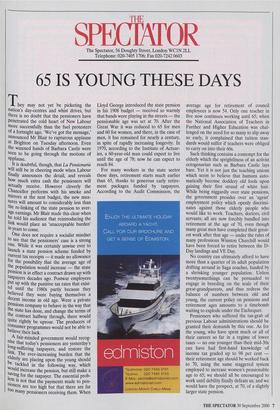SPECTATOR
The Spectator, 56 Doughty Street, London WC1N 2LL Telephone: 020-7405 1706; Fax 020-7242 0603
65 IS YOUNG THESE DAYS
They may not yet be picketing the nation's day-centres and whist drives, but there is no doubt that the pensioners have penetrated the cold heart of New Labour more successfully than the fuel protesters of a fortnight ago. 'We've got the message,' announced Mr Blair to rapturous applause at Brighton on Tuesday afternoon. Even the wizened hands of Barbara Castle were seen to be going through the motions of applause.
It is doubtful, though, that La Pensionaria Will still be in cheering mode when Labour finally announces the detail, and reveals how much extra cash the pensioners will actually receive. However cleverly the Chancellor performs with his smoke and mirrors at the next budget, the new mea- sures will amount to considerably less than the re-linking of the state pension to aver- age earnings. Mr Blair made this clear when he told his audience that reintroducing the link would place an 'unacceptable burden' in years to come.
One does not require a socialist mindset to see that the pensioners' case is a strong one. While it was certainly unwise ever to launch a state pension scheme funded by current tax receipts — it made no allowance for the possibility that the average age of the population would increase — the state pension is in effect a contract drawn up with laxPayers decades ago. Postwar employees put up with the punitive tax rates that exist- ed until the 1980s partly because they believed they were buying themselves a decent income in old age. Were a private Pensions company to behave in the way that the state has done, and change the terms of the contract halfway through, there would quite rightly be uproar. The producers of consumer programmes would not be able to believe their luck.
A fair-minded government would recog- nise that today's pensioners are yesterday's long-suffering taxpayers, and restore the link- The ever-increasing burden that the elderly are placing upon the young should be tackled in the following way, which Would increase the pension, but still make a saving for the taxpayer. The essential prob- lem is not that the payments made to pen- sioners are too high but that there are far too many pensioners receiving them. When
Lloyd George introduced the state pension in his 1908 budget — received so warmly that bands were playing in the streets — the pensionable age was set at 70. After the Great War it was reduced to 65 for men and 60 for women, and there, in the case of men, it has remained for nearly a century, in spite of rapidly increasing longevity. In 1970, according to the Institute of Actuar- ies, a 60-year-old man could expect to live until the age of 78; now he can expect to reach 84.
For many workers in the state sector these days, retirement starts much earlier than 65, thanks to generous early retire- ment packages funded by taxpayers. According to the Audit Commission, the average age for retirement of council employees is now 54. Only one teacher in five now continues working until 65; when the National Association of Teachers in Further and Higher Education was chal- lenged on the need for so many to slip away so early, it complained that tuition stan- dards would suffer if teachers were obliged to carry on into their 60s.
Such thinking contains a contempt for the elderly which the sprightliness of an activist octogenarian such as Barbara Castle lays bare. Yet it is not just the teaching unions which seem to believe that humans auto- matically become doddery old fools upon gaining their first strand of white hair. While being niggardly over state pensions, the government presides over an `ageist' employment policy which openly discrimi- nates against those elderly people who would like to work. Teachers, doctors, civil servants; all are now forcibly bundled into retirement at the age of 70, even though many great men have completed their great- est work after that age — under the rules of many professions Winston Churchill would have been forced to retire between the D- Day landings and VE Day.
No country can ultimately afford to have more than a quarter of its adult population drifting around in Saga coaches, funded by a shrinking younger population. Unless twentysomethings can be persuaded to engage in breeding on the scale of their great-grandparents, and thus redress the balance of numbers between old and young, the current policy on pensions and retirement ages amounts to a timebomb waiting to explode under the Exchequer.
Pensioners who suffered the tax-grab of previous Labour administrations should be granted their demands by this one. As for the young, who have spent much or all of their careers so far in a regime of lower taxes — no one younger than their mid-30s can have had first-hand knowledge of income tax graded up to 98 per cent their retirement age should be worked back to 70, using the same staggered system employed to increase women's pensionable age to 65; we should all be encouraged to work until debility finally defeats us; and we would have the prospect, at 70, of a slightly larger state pension.


























































































 Previous page
Previous page